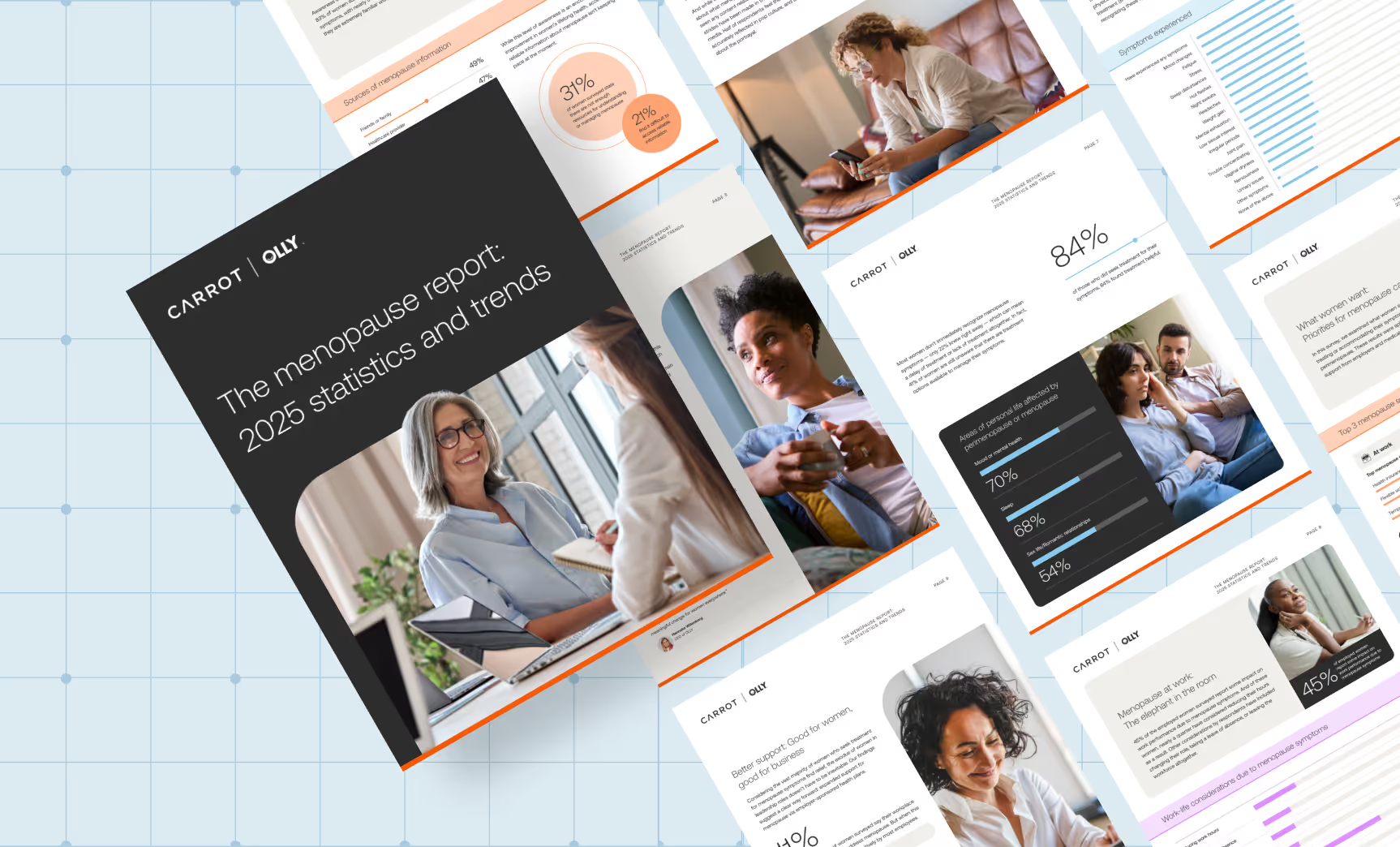In the world of company benefits, maternity coverage is table stakes. Fertility and family building have also increasingly become part of the conversation. But the reproductive health needs of employees, including hormonal health, don't stop there.
Menopause symptoms can make daily life more difficult — including work. Even so, stigma and lack of awareness make it hard for employees to get the care they need.
At Carrot, we believe that employers can support their employees well beyond their fertility and pregnancy journeys. Here’s why HR should consider offering benefits for hormonal aging, too.
A refresher on menopause and hormonal aging
As we age, so do our hormones. As someone’s ovarian reserve (number of eggs) diminishes, estradiol (a form of estrogen) levels drop, and ovulation, menstruation, and the ability to get pregnant start to come to an end. Menopause occurs when someone who previously had periods stops having them for at least 12 months. The average age for menopause is 51, but symptoms can begin up to a decade prior in the perimenopause, or menopausal transition, period.
Menopause symptoms on their impact on employees
An estimated 1.1 billion people worldwide will have experienced menopause by 2025. Despite popular beliefs around menopause, the experience can bring about far more than just hot flashes. Employees may also experience symptoms that make it more challenging for them to feel comfortable, happy, and productive at work — which is in stark contrast to the reality that many people may feel even more confident and in control of their careers in their 40s and 50s. Common, disruptive symptoms include:
- Fatigue: Poor sleep is common in menopause. When someone continues not to get enough sleep for a sustained period of time, fatigue can set in. Fatigue might mean running late for morning meetings or feeling sluggish throughout the workday.
- Brain fog: A lack of adequate sleep and fatigue can contribute to feelings of brain fog, or feeling unfocused and forgetful. Brain fog might make it difficult for an employee to feel like they’re bringing their A-game to work, despite their best efforts.
- Memory lapses: Estrogen is linked to memory performance, which means lower levels might impact memory even beyond brain fog.
- Mood changes: Dropping hormone levels can also lead to mood swings and even mood disorders like depression and anxiety. This can contribute to, or compound, the stress someone may already feel at work.
- Nausea: Nobody wants to be at work when they feel sick to their stomach.
These and other symptoms can be so disruptive that, according to a 2023 survey, 80% of people going through menopause in the workplace described it as challenging.
Hormonal aging can also increase health risks over time. Estrogen is protective against heart disease, and the loss of estrogen results in rapid bone loss. Both of these heightened risks can impact your employees’ health in the long run.
Why providing menopause support can increase employee satisfaction
Just 24% say their employer has offered menopause healthcare benefits, though only 9% said those benefits were significant. Among those who don't have menopause benefits from their employer, 60% say it would have increased their job satisfaction if they did have significant support. More than half have considered making an employment change because of menopause, including moving from a full-time role to a part-time role, retiring early, or quitting altogether. Likely due to stigma around menopause and women’s health more broadly, employees rarely speak up about their needs before, during, and after menopause.
In addition to feeling a lack of support at work, those going through menopause also report that they had trouble finding accurate information related to menopause. A 2021 survey with 1,000 respondents found that almost one-third of respondents didn’t think there was enough information available before they went through menopause. The same researchers released a 2022 survey and found that around the same percentage didn’t know what perimenopause was or when it typically starts.
It’s important to educate individuals on these changes early, so they can be proactive about their health and take preventive measures, understand interventions that are available that can help symptoms, and recognize that menopause care is not a one-size-fits-all approach.
How employers can support their employees through menopause
Although menopause care is often covered under standard insurance, accessing it isn’t easy. In fact, according to a 2018 survey from the American Association of Retired Persons (AARP), 42% of women said they hadn’t talked about menopause with a healthcare provider — and only one in five were referred to a menopause specialist.
When people do talk to their providers about menopause, they may find that they aren’t knowledgeable enough to support them. Only 20% of OB/GYN residency programs offer training in menopause care, most of which are elective. As a result, the AARP survey findings reported that around 80% of residents felt “barely comfortable” around menopause care. Another survey found that over half of their respondents who were OB/GYN residents in their fourth year said they needed to learn more about the many aspects of menopause care, including therapies, bone health, heart disease, and metabolic health.
Carrot can help you expand benefits to be more inclusive of employees of all ages and support them throughout the entire lifespan. With Carrot, you’ll be able to bring your employees access to a network of providers vetted for menopause care, avenues for community support through what can be an isolating experience, and additional tools and recommendations to help your employees be as happy and healthy as possible.










.avif)



